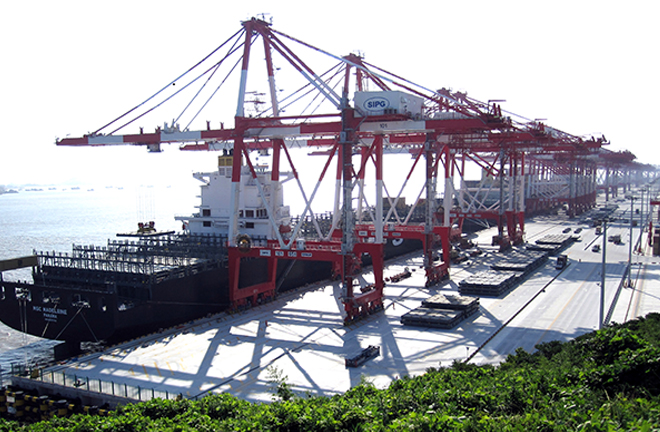China’s FTZ Excellence Index released

Shanghai Yangshan Deep Water Port, the world's biggest automated container terminal, started trial operations in December 2017. (MARQUEED/ENGLISH WIKIPEDIA)
SHANGHAI—Government functions are transforming in the reform of free trade zones, said experts at the launch event of the Free Trade Zone Excellence Index and the concurrent forum on free trade zone development at Shanghai University of Finance and Economics (SUFE) in mid-March.
The release of the Free Trade Zone Excellence Index represents China’s constructive role in designing systems to evaluate the world’s free trade zones, said SUFE Vice-President Chen Xinyuan.
Zhao Xiaolei, director of the Free Trade Zone Research Institute at SUFE, said that the Free Trade Zone Excellence Index consists of four sub-indices: business facilitation, economic contribution, innovation and sustainability. The sub-index of business facilitation is used to measure the facilitation of investment and trade in a free trade zone, which aims to reflect the “liberalized” institutional environment in which the free trade zone operates.
The sub-index of economic contribution is used to measure the contribution of a free trade zone to the regional economy and aims to reflect its economic effect. The sub-index of innovation is used to measure the performance of a free trade zone in knowledge promotion, technological innovation and the development of SMEs. The sub-index of sustainability is used to measure the performance of a free trade zone in terms of sustainable development.
Since the China (Shanghai) Pilot Free Trade Zone was launched in September 2013, China’s State Council has approved 11 pilot free trade zones in Guangdong, Tianjin, Fujian and other regions.
Tong Jiadong, director of the China Pilot Free Trade Zones Research Center at Nankai University, said that the pilot free trade zones must try to address some major problems that have not been solved in the four decades since the reform and opening up. With the aid of an open environment, they need to accomplish the specific task of stimulating regional economic development and establishing a long-term development model based on geographical distribution.
The broad task of free trade zone reform is to establish an international, law-based and market-based business environment while establishing a window for a new system of open economy, Tong said. The core is to transform government functions, i.e. to effect a shift in the government’s role from participant and controller to referee and service provider. In this process, through the construction of the mechanism, the coordination between the “invisible hand” and “visible hand” can be better facilitated.
Consistently taking systemic innovation as its core task, the Shanghai Pilot Free Trade Zone has achieved a series of achievements in investment and trade rules, the transformation of government functions and the establishment of an open economic system over the past several years.
Mao Yanhua, deputy director of the Institute of Free Trade Zones at Sun Yat-sen University, said that the pilot free trade zones have comprehensively deepened the reform of the investment management system, accelerated the innovation of the trade facilitation system and deepened innovation of the financial opening and reform. They have learned from the experience of the typical free-trade port construction in the world, explored the establishment of free-trade port areas and innovative environments conducive to participation in global value chain competitions and drawn on the experience of high-standard international economic and trade rules and other stress test items, laying a good foundation for the development of a higher-level open economy.
At present, higher-level trade liberalization rules are brewing. In the process of restructuring global trade and investment rules, China has increasingly become the focus of attention from developed Western countries, said He Xiaoyong, executive deputy director of the Free Trade Zone Legal Research Institute at the East China University of Political Science and Law.
Cui Fan, a professor from the School of International Trade and Economics at the University of International Business and Economics, said that China needs to improve its own innovation capacity and competitiveness and increase the overall competitiveness of the core regional value chains. Building free-trade ports and integrating logistics, capital flow, information flow and talent are the key measures to promote China as the core of regional value chains. At the same time, China needs to try to avoid the adverse influence of the siphon effect of free-trade ports, which is to say, they might attract local high-end production factors in the short term, Cui said.
(edited by JIANG HONG)

 PRINT
PRINT CLOSE
CLOSE